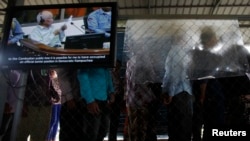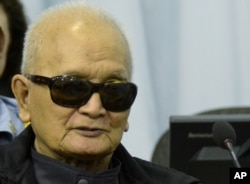PHNOM PENH —
Prosecutors at Cambodia’s war crimes court asked judges on Monday to hand down a life term against two ex-leaders of the Khmer Rouge. Their request comes in the closing days of the first of at least two expected trials of these defendants, whose regime is blamed for the deaths of 2 million people.
After a trial that has lasted nearly two years, the prosecution concluded Monday that the defendants, Nuon Chea and Khieu Samphan, were central to a regime that had turned Cambodia into a “slave state unparalleled in the modern era."
Prosecutor Chea Leang said both defendants had lied to the court, shown no remorse or regret, and refused to take responsibility for the crimes with which the evidence had shown they were guilty. As a result, she added, the prosecution saw no grounds for a reduction in the penalty.
“The prosecution requests the Trial Chamber and Your Honors to punish the accused, Nuon Chea and Khieu Samphan, for life imprisonment, which is the only punishment that they deserve and that is the international standard for these crimes as well," said the prosecutor though an interpretor.
There is no death penalty in Cambodia’s courts.
Nuon Chea, known as "Brother Number Two," was deputy to the late Khmer Rouge leader Pol Pot, and is widely regarded as the movement’s chief ideologue.
Khieu Samphan was head of state of the government known as Democratic Kampuchea, which ruled Cambodia between 1975 and 1979.
The indictment against the two elderly defendants includes charges of genocide, war crimes and crimes against humanity. Both men have denied all charges. The case is so complex that the court has divided it into a number of mini-trials. This month sees the end of the hearings in the first of those.
The initial mini-trial has focused mainly on crimes against humanity in two forced movements of people: the first when the Khmer Rouge emptied all urban areas, including Phnom Penh in April 1975, and later, when hundreds of thousands of people were forced to move across the country. The trial also considered one instance of mass killings, when hundreds of soldiers and officials from the defeated Lon Nol regime were executed in 1975.
A second mini-trial, should it ever proceed, will examine allegations of genocide, war crimes and other crimes against humanity in a bid to ensure that the court assesses a range of charges more representative of the Cambodian people’s suffering.
On Monday, Prosecutor William Smith said the thousands of deaths that had resulted from the forced evacuation of every one of the two million residents of Phnom Penh when the Khmer Rouge took control were fully predictable, adding that there was no basis in international law for the movement to have acted in that way.
“It is clear that the forced transfer itself was a crime against humanity.
"Nuon Chea and Khieu Samphan planned and ordered the removal of millions of people from their lawful residences in Phnom Penh without permissible grounds and did not allow them to return to their homes for the whole time that they were in power," said Smith.
The prosecution holds that the evidence showed both defendants were deeply implicated in the decisions by the Communist Party of Kampuchea (CPK) to forcibly move people as well as in the policy to execute perceived enemies of the revolution.
Also Monday, Smith dismissed Nuon Chea’s claims that he had no real power and that he was not responsible for atrocities. The prosecution was equally withering about Khieu Samphan’s claims that he did not know crimes had taken place. Khieu Samphan, said Smith, was a man “with much to hide."
“To this day Khieu Samphan seeks to present himself as a man of integrity, honesty, an intellectual," he said. "A man who was different from the other leaders. He says those other leaders kept him in the dark, he says he did not ask questions because he respected the CPK rule of secrecy, and Pol Pot used him as a figurehead."
Smith continued, "Somehow this unlucky pawn found himself at the pinnacle of a slave state, a member of the most secretive and powerful bodies of the CPK, surrounded by mass murder and yet completely unaware of what was happening around him. The only man in all of Cambodia who knew nothing, saw nothing, and heard nothing.”
The case against the ex-leaders of the Khmer Rouge began its hearings in late 2011 with four defendants, but only two remain after one died and another was ruled unfit for trial due to dementia.
Defense teams are expected to address the court in the coming days before the judges retire to consider a verdict, which is expected by the middle of next year.
After a trial that has lasted nearly two years, the prosecution concluded Monday that the defendants, Nuon Chea and Khieu Samphan, were central to a regime that had turned Cambodia into a “slave state unparalleled in the modern era."
Prosecutor Chea Leang said both defendants had lied to the court, shown no remorse or regret, and refused to take responsibility for the crimes with which the evidence had shown they were guilty. As a result, she added, the prosecution saw no grounds for a reduction in the penalty.
“The prosecution requests the Trial Chamber and Your Honors to punish the accused, Nuon Chea and Khieu Samphan, for life imprisonment, which is the only punishment that they deserve and that is the international standard for these crimes as well," said the prosecutor though an interpretor.
There is no death penalty in Cambodia’s courts.
Nuon Chea, known as "Brother Number Two," was deputy to the late Khmer Rouge leader Pol Pot, and is widely regarded as the movement’s chief ideologue.
Khieu Samphan was head of state of the government known as Democratic Kampuchea, which ruled Cambodia between 1975 and 1979.
The indictment against the two elderly defendants includes charges of genocide, war crimes and crimes against humanity. Both men have denied all charges. The case is so complex that the court has divided it into a number of mini-trials. This month sees the end of the hearings in the first of those.
The initial mini-trial has focused mainly on crimes against humanity in two forced movements of people: the first when the Khmer Rouge emptied all urban areas, including Phnom Penh in April 1975, and later, when hundreds of thousands of people were forced to move across the country. The trial also considered one instance of mass killings, when hundreds of soldiers and officials from the defeated Lon Nol regime were executed in 1975.
A second mini-trial, should it ever proceed, will examine allegations of genocide, war crimes and other crimes against humanity in a bid to ensure that the court assesses a range of charges more representative of the Cambodian people’s suffering.
On Monday, Prosecutor William Smith said the thousands of deaths that had resulted from the forced evacuation of every one of the two million residents of Phnom Penh when the Khmer Rouge took control were fully predictable, adding that there was no basis in international law for the movement to have acted in that way.
“It is clear that the forced transfer itself was a crime against humanity.
"Nuon Chea and Khieu Samphan planned and ordered the removal of millions of people from their lawful residences in Phnom Penh without permissible grounds and did not allow them to return to their homes for the whole time that they were in power," said Smith.
The prosecution holds that the evidence showed both defendants were deeply implicated in the decisions by the Communist Party of Kampuchea (CPK) to forcibly move people as well as in the policy to execute perceived enemies of the revolution.
Also Monday, Smith dismissed Nuon Chea’s claims that he had no real power and that he was not responsible for atrocities. The prosecution was equally withering about Khieu Samphan’s claims that he did not know crimes had taken place. Khieu Samphan, said Smith, was a man “with much to hide."
“To this day Khieu Samphan seeks to present himself as a man of integrity, honesty, an intellectual," he said. "A man who was different from the other leaders. He says those other leaders kept him in the dark, he says he did not ask questions because he respected the CPK rule of secrecy, and Pol Pot used him as a figurehead."
Smith continued, "Somehow this unlucky pawn found himself at the pinnacle of a slave state, a member of the most secretive and powerful bodies of the CPK, surrounded by mass murder and yet completely unaware of what was happening around him. The only man in all of Cambodia who knew nothing, saw nothing, and heard nothing.”
The case against the ex-leaders of the Khmer Rouge began its hearings in late 2011 with four defendants, but only two remain after one died and another was ruled unfit for trial due to dementia.
Defense teams are expected to address the court in the coming days before the judges retire to consider a verdict, which is expected by the middle of next year.








